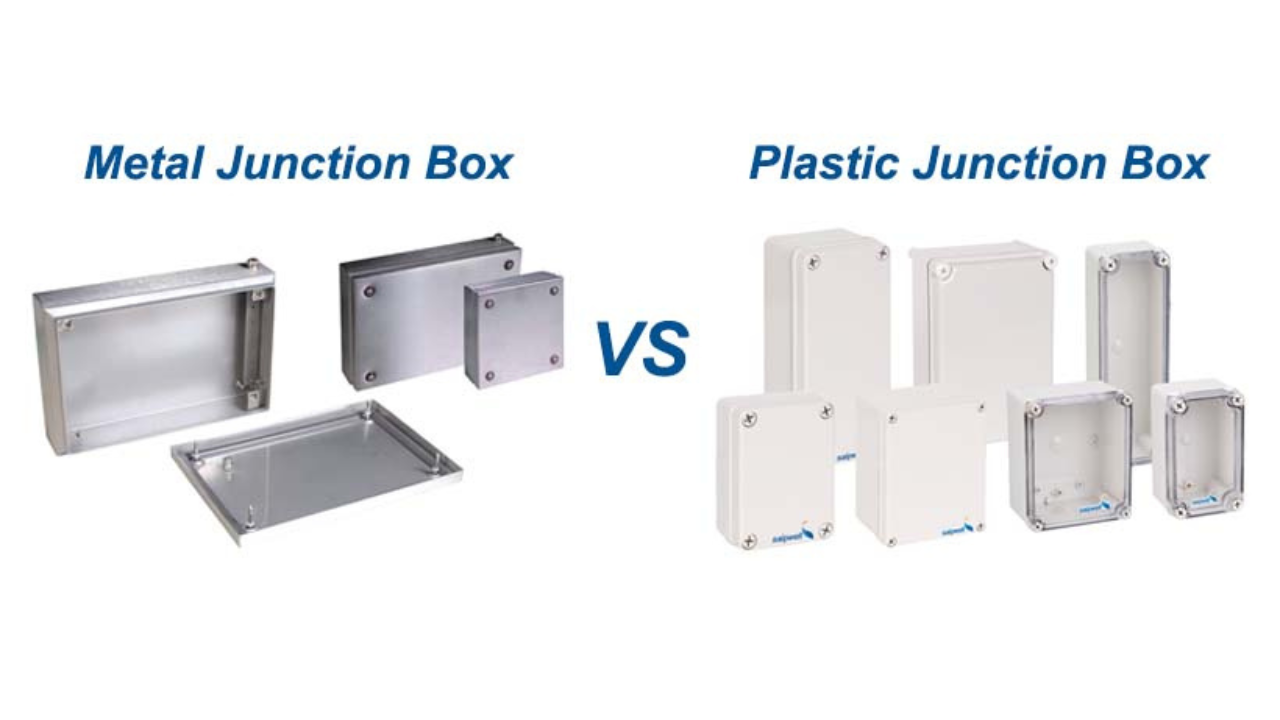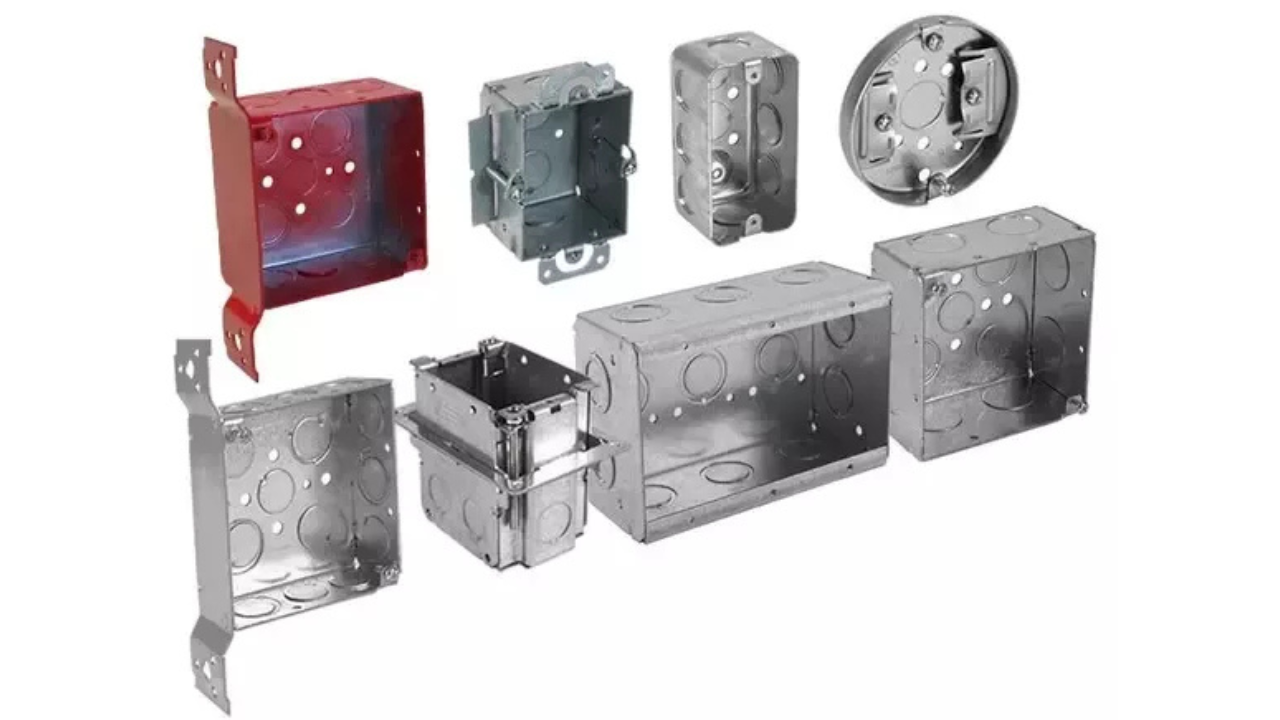When it comes to choosing a junction box, you have an option of going for plastic junction box or metal junction box.
However, without the right information about the difference between these two, it can be difficult to decide on the right junction box material.
It is actually for this reason that we will compare the key difference between plastic and metal junction boxes.
Difference between Plastic and Metal Junction Box

· Materials
A plastic junction box is made from non-conductive and durable materials. Examples of such materials that you should know are polycarbonate, polyvinyl chloride (PVC), acrylonitrile butadiene styrene (ABS), and fiberglass.
On other hand, a metal junction box is made from conductive metal material. Examples of such materials to note are aluminum, stainless steel, or cast iron.
· Price Difference
Plastic junction boxes are generally affordable than metal junction boxes. When you come down to material prices, the manufacturing and installation costs, plastic junction boxes take the lead.
Although high performance plastics such as polycarbonate may be expensive, you cannot compare the cost to most metallic junction box.
However, when you examine metal junction boxes, the cost of production, installation, and initial material pricing is very high. Materials like aluminum, steel, and cast iron are very expensive.
Additionally, these materials require extensive fabrication work, which is typically performed by highly skilled personnel, making it very costly.
· Weight
Non-metallic junction boxes such as PVC junction boxes are generally lighter than metal junction boxes. The reason for this is that the materials used in the construction of plastic junction boxes, such as fiberglass, have very low density.
This makes them very easy to handle, install, and also increases their mobility.
In contrast, the materials used in the construction of metal junction boxes are of exceptionally high density, making them very heavy.
Their heavy nature makes the installation and fabrication processes on the metal junction boxes very complicated. Note that this also tampers with their mobility, making it difficult.
· Strength and Durability
From PVC junction box, polycarbonate junction boxes, to ABS enclosure boxes, they are not as durable as metallic junction boxes.
However, this does not imply that non-metallic junction boxes are not strong enough.
Generally, metal junction boxes are very strong and can withstand hard environments. Take for example, mining electrical enclosures and boxes.
With stainless steel junction boxes or aluminum junction boxes, expect an electrical box that can withstand hard handling. Even in the worst case possible, these junction boxes guarantee superior performance.
· Corrosion Resistance
Most plastic junction boxes tend to outperform metallic junction boxes. For instance, polycarbonate junction boxes offer superior performance in most weather conditions.
Although stainless steel junction boxes and aluminum junction boxes offer better performance when it comes to corrosion resistance, plastics are superior options. In fact, metal junction boxes may require additional treatment to match non-metallic junction box.
· Safety in terms of Electrical Conductivity
Plastic junction boxes are generally safer than metal junction boxes. This is so, because they are basically made from non-conductive materials such as polycarbonates, PVC, ABS, ext. This virtually eliminates the risks of electrical accidents and fatalities.
These junction boxes do not require grounding at any given point, making them ideal for indoor applications that are easily accessible.
However, the metal junction boxes are made from conductive materials. These materials allow electric currents to flow through them, posing a high risk to users.
The only effective way to make these metal junction boxes safer to work with is to ensure they are properly grounded.
· EMI/RFI Shielding
Metal junction boxes offer greater EMI/RFI shielding compared to plastic junction boxes. This is because metal junction boxes conduct electricity and will require superior shielding to prevent electromagnetic and radio frequency interference.
This is crucial since it operates in very sensitive locations, such as data centers or delicate medical facilities. Note that shielding is designed to prevent signal distortion and frequency transmission interference in nearby circuits.
However, because of their non-conductive nature, plastic junction boxes require no EMI/RFI shielding. This makes them unsuitable for settings where electrical noise could disrupt sensitive equipment.

Plastic vs Metal Junction Box-Which one to Buy
Whether to buy plastic junction box or metal junction box will entirely depending on your needs. That is, specific applications among other factors such as costs.
However, in general you will find polymer junction boxes in residential settings. Usually, this is attributed to lightweight, very mobile, and affordability.
The metal junction box, on the other hand, is preferred for use within industrial areas. This is because they are robust, fire-resistant, and provide EMI shielding.
Why Choose KDM Junction Boxes

As a trusted and industry leader in junction boxes fabrication in China, KDMSTEEL offers a wide range of material options. From stainless steel, aluminum, galvanized steel, PVC to polycarbonate junction boxes.
Our junction boxes are fabricated in accordance with the NEMA, IEC and UL safety standards. Depending on your specific application requirements, KDM customizes every junction box to meet client’s specific needs.
With years of experience in junction box manufacturing in China, our engineers will help you get high performance electrical box for your installations – contact us now for any inquiries.


